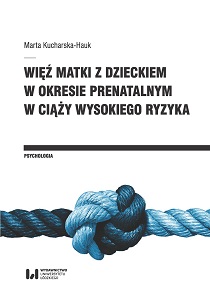Więź matki z dzieckiem w okresie prenatalnym w ciąży wysokiego ryzyka
Maternal-fetal attachment in high-risk pregnancy
Author(s): Marta Kucharska-Hauk
Subject(s): Social Sciences, Psychology, Culture and social structure
Published by: Wydawnictwo Uniwersytetu Łódzkiego
Keywords: high-risk pregnancy; maternal-fetal attachment; prenatal attachment; pregnancy with congenital malformations; pregnancy experience
Summary/Abstract: The purpose of this study was to compare the Maternal-Fetal Attachment in healthy pregnancies and pregnancies with congenital disorders and other complications. In addition, identify predictors of MFA in physiological and high-risk pregnancies.The study group included women in pregnancies with congenital disorder (n = 65) or with other pregnancy complications (n = 65). A third group included women in healthy pregnancies (n = 65). Data were collected by: Maternal-Fetal Attachment Scale, Questionnaire of Attachment Styles, Rosenberg Self-Esteem Scale, State-Trait Anxiety Inventory, Social Support Scale, standardized interview, Dependency on Intimate Partner Scale, Pregnancy Experiences Scale.No significant differences in MFA were found between the groups. No predictors of MFA were observed for the women with a pregnancy with congenital disorder. In the group of pregnancies with other complications, the only predictor of attachment intensity was pregnancy experience: a more negative attitude toward pregnancy was associated with lower MFA. In physiological pregnancies, MFA was found to be determined by pregnancy experience, gestational age, maternal age and dependency on one’s intimate partner. MFA increased as pregnancy progressed. Younger mothers in physiological pregnancies, who have more positive pregnancy experiences and are less dependent on partner, achieve higher levels of MFA. The presence of high-risk pregnancy, or its absence, does not differentiate the intensity of the emotional bond between mother and fetus. However, women with healthy pregnancies demonstrate different predictors of MFA than those with high-risk pregnancies.The purpose of this study was to compare the Maternal-Fetal Attachment in healthy pregnancies and pregnancies with congenital disorders and other complications. In addition, identify predictors of MFA in physiological and high-risk pregnancies. The study group included women in pregnancies with congenital disorder (n = 65) or with other pregnancy complications (n = 65). A third group included women in healthy pregnancies (n = 65). Data were collected by: Maternal-Fetal Attachment Scale, Questionnaire of Attachment Styles, Rosenberg Self-Esteem Scale, State-Trait Anxiety Inventory, Social Support Scale, standardized interview, Dependency on Intimate Partner Scale, Pregnancy Experiences Scale. No significant differences in MFA were found between the groups. No predictors of MFA were observed for the women with a pregnancy with congenital disorder. In the group of pregnancies with other complications, the only predictor of attachment intensity was pregnancy experience: a more negative attitude toward pregnancy was associated with lower MFA. In physiological pregnancies, MFA was found to be determined by pregnancy experience, gestational age, maternal age and dependency on one’s intimate partner. MFA increased as pregnancy progressed. Younger mothers in physiological pregnancies, who have more positive pregnancy experiences and are less dependent on partner, achieve higher levels of MFA. The presence of high-risk pregnancy, or its absence, does not differentiate the intensity of the emotional bond between mother and fetus. However, women with healthy pregnancies demonstrate different predictors of MFA than those with high-risk pregnancies.
- E-ISBN-13: 978-83-8220-247-2
- Print-ISBN-13: 978-83-8220-246-5
- Page Count: 186
- Publication Year: 2020
- Language: Polish
- eBook-PDF
- Table of Content
- Introduction

